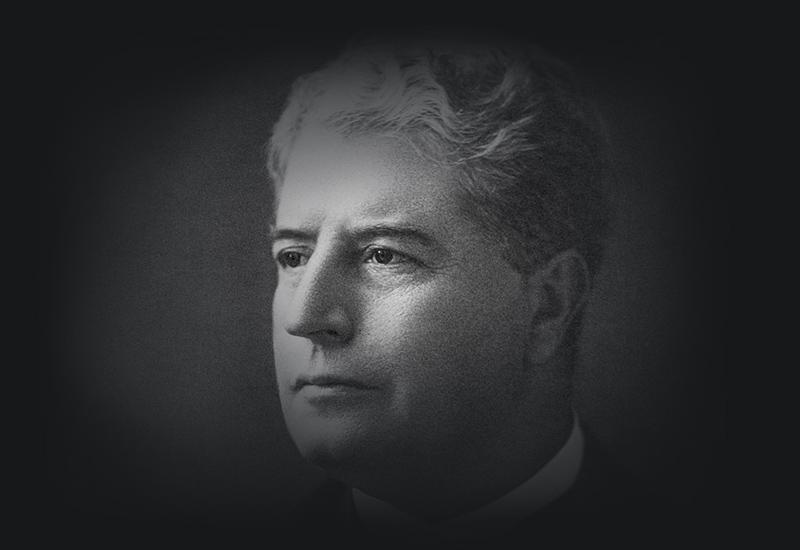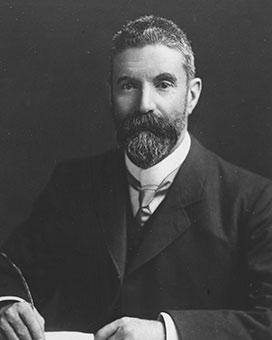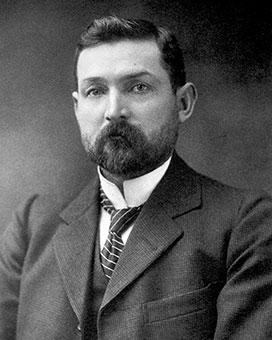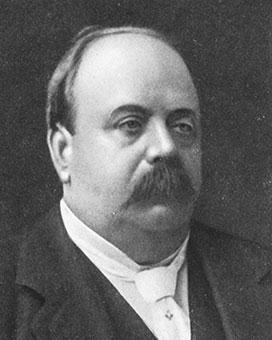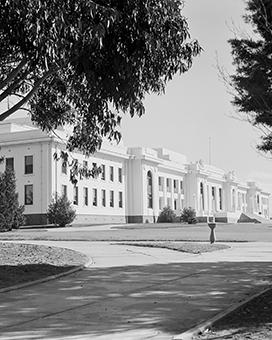Allen, George
First head of the Commonwealth Treasury 1901–16, Allen had been an accountant in the Victorian Treasury.
Anderson, Maybanke
New South Wales political reformer, federationist and educator who founded the Womanhood Suffrage League of New South Wales in 1891 and was active in the National Council of Women and other organisations until her death in 1927.
Balfour, (Lord) Arthur James
Britain's Conservative Prime Minister 1902–05 during the Barton, Deakin, Watson and Reid governments, and Britain's Foreign Secretary 1916–19 during the Hughes government.
Barton, (Lady) Jane
Jane Barton was prime ministerial wife 1901–03. She was afterwards foundation president of the Queens Club in Sydney; and had been a vice-president of the Sydney Women's Federation League in 1899.
National Archives of Australia Commonwealth Person CP 930.
Bavin, (Sir) Thomas
Among the young federationists in Edmund Barton's circle, Bavin was appointed Prime Minister's private secretary in 1901 and served both Barton and Alfred Deakin. In 1904, when Chris Watson became Prime Minister, Bavin resumed his Sydney practice as a barrister, coaching students including William Hughes. Bavin was Deakin's co-correspondent to the London Morning Post 1907–11. Bavin later entered state politics and was premier of New South Wales 1927–30.
Braddon, (Sir) Edward Nicholas Coventry
Free Trade Member of the House of Representatives 1901–03 (Tasmania) and 1903–04 (Wilmot). Deputy Leader of the Opposition until his death in 1904, Braddon had been premier of Tasmania 1894–99 and a delegate to the 1897–98 Federation convention.
Cecil, (Lord Salisbury) Robert
Britain's Conservative Prime Minister 1895–1902, during the Barton government.
Chapman, (Sir) Austin
Member of the House of Representatives (Eden–Monaro) for the Protectionist Party 1901–10, Deakin Liberal Party 1910–17, and Nationalist Party 1917–26. Minister for Defence in the first Deakin government (24 September 1903 – 27 April 1904), Postmaster-General (5 July 1905 – 30 July 1907) and Minister for Trade and Customs (30 July 1907 – 13 November 1908) in the second Deakin government. In the Bruce–Page government, he was Minister for Trade and Customs and for Health (9 February 1923 – 26 May 1924). Chapman had been a strong federationist as a member of the New South Wales parliament (Braidwood) 1891–1901.
National Archives of Australia Commonwealth Person CP 709.
Churchill, (Sir) Winston Spencer
Member of the House of Commons 1900–29 and Britain's Prime Minister 1940–45 and 1951–55, during the Menzies, Fadden and Curtin governments.
Clark, Andrew Inglis
Tasmanian parliamentarian and judge, a delegate to the 1890 Federation Conference in Melbourne and a key author of the original draft of Australia's Constitution in 1891.
Cockerill, George
Melbourne Age journalist covering the federation campaign 1898–1901, and Federal parliament 1901–10. Cockerill became chief of staff on the Age and chief leader-writer 1914–26, from 1926 to 1928 was editor-in-chief of the Sydney Daily Telegraph and from 1929 to 1939 leader-writer for the Melbourne Herald. In 1928–29, Cockerill was employed by the Commonwealth Development and Migration Commission as chief of publicity.
Deakin, Alfred
Member of the House of Representatives (Ballaarat) for the Protectionist Party 1901–10 and the Liberal Party 1910–13. Deakin was the first Attorney-General, in the Barton government (1901–03), Prime Minister 3 times (1903–04, 1905–08, 1909–10), and Minister for External Affairs in his own governments in 1903–04 and 1905–08. As a Victorian parliamentarian and leading federationist, Deakin had been a delegate to the 1890 Federation Conference and to both federation Conventions (1891 and 1897–98) and a member of the Constitution Bill deputation in London in 1900.
Read more about Alfred Deakin.
National Archives of Australia Commonwealth Person CP 9.
Dibbs, (Sir) George Richard
New South Wales parliamentarian 1874–1895 and Premier 1885, 1886–87, 1889, and 1891–94. Originally a free trader, Dibbs became a protectionist in 1887, and thus a political rival of George Reid. Although he was a delegate to the 1891 Federation Convention, Dibbs was not an enthusiastic supporter of federation, promoting Sydney's right to be the federal capital and arguing for a strong Senate.
Dickson, (Sir) James Robert
Dickson was the first Commonwealth Minister for Defence from 1 January 1901 until his sudden death ten days later. He had been Queensland Premier 1898–99 and a member of the Constitution Bill deputation in London in 1900.
Downer, (Sir) John William
Protectionist Senator for South Australia 1901–03, Downer then returned to the state parliament. He had been South Australian Premier 1885–87 and in 1892, and was one of the 3 members of the Constitutional drafting committee at the 1897–98 federation Convention.
Drake, James George
Protectionist Senator for Queensland 1901–06 and Postmaster-General 1901–03 then briefly Minister for Defence in the last month of the Barton government. Drake was Attorney-General in the first Deakin government (24 September 1903 – 27 April 1904) and Vice-President of the Executive Council in the Reid government (18 August 1904 – 5 July 1905).
Edward VII, King
Eldest son of Queen Victoria. With Queen Alexandra, British monarch 1901–10 and Australia's head of state during the Barton, Deakin, Watson, Reid and Fisher governments.
Forrest, (Sir) John
Member of the House of Representatives (Swan) for the Protectionist Party 1901–06, West Australia Party 1906–10, Deakin Liberal Party 1910–17, and the Nationalist Party 1917–18. Postmaster-General (1–10 January 1901) and Minister for Defence (10 January 1901 – 24 September 1903) in the Barton government, Minister for Home Affairs in the Deakin government (24 September 1903 – 27 April 1904), Treasurer (5 July 1905 – 30 July 1907) in the second Deakin government, Treasurer in the third Deakin government (2 June 1909 – 29 April 1910), and Treasurer (24 June 1913 – 17 September 1914) in the Cook government, Treasurer (17 February 1917–27 March 1918) in the Hughes government. Forrest had been Premier of Western Australia 1890–1901.
Fysh, (Sir) Philip Oakley
Free Trade Member of the House of Representatives 1901–03 (Tasmania), Member of the House of Representatives (Denistone) for the Protectionist Party 1903–06 and the Anti-Socialist Party 1906–10. Minister without portfolio (March 1901 – 24 September 1903) in the Barton government, and Deakin’s Postmaster-General (24 September 1903 – 27 April 1904). Fysh had been Tasmanian Premier 1887–92 and as Tasmania’s Agent-General in London, a member of the Constitution Bill deputation in 1900.
Garran, (Sir) Robert Randolph
Appointed first head of the Attorney-General’s department and parliamentary draftsman on 1 January 1901, Garran remained in this post until 5 February 1932. He served the governments of ten prime ministers, Barton, Deakin, Watson, Reid, Fisher, Cook, Hughes, Bruce, Scullin and Lyons. As a young Sydney federationist in Barton’s circle, Garran had been secretary to the 1897–98 Constitutional drafting committee.
National Archives of Australia Commonwealth Person CP 396.
George V, King
Grandson of Queen Victoria, son of King Edward VII, as Duke of York opened first Commonwealth parliament in 1901, with Queen Mary British monarch 1910–36.
Griffith, (Sir) Samuel Walker
First Chief Justice of the High Court 1903–19, Griffith had attended the 1890 Federation Conference and was a major figure in drafting the original Constitution at the 1891 federation Convention. He was Premier of Queensland 1883–88, and Queensland Chief Justice 1893–1903.
Groom, (Sir) Littleton Ernest
Member of the House of Representatives (Darling Downs) 1901–29 and 1931–36, Groom was Minister for Home Affairs and then Attorney-General (12 October 1906 – 13 November 1908) replacing Isaac Isaacs in the second Deakin government, Minister for External Affairs in the third Deakin government (2 June 1909 – 29 April 1910), and Minister for Trade and Customs in the Cook government (24 June 1913 – 17 September 1914). In the Hughes government he served as honorary Minister (17 February 1917 – 16 November 1917), Vice-President of the Executive Council (16 November 1917–27 March 1918), Minister for Works and Railways (27 March 1918 – 21 December 1921), and Attorney-General (21 December 1921 – 9 February 1923). In the Bruce–Page government he was Attorney-General (9 February 1923 – 18 December 1925), Minister for Trade and Customs and Minister for Health (29 May – 13 June 1924). From 1926 to 1929, he was Speaker of the House of Representatives.
Henry, (Sir) Josiah
A Senator for South Australia (1901–13), and Attorney-General in the Reid government (18 August 1904 – 5 July 1905), Symon had been a South Australian parliamentarian and federalist, and delegate to the 1897–98 federal convention.
Higgins, Henry Bournes
Protectionist Member of the House of Representatives 1901–06 (North Melbourne), and Attorney-General in the Watson Labor government (1904). In 1906, Higgins was appointed a judge of the High Court, with the special duty of presiding over the Conciliation and Arbitration Court. As a federationist and member of the Victorian parliament, Higgins had been a delegate to the 1897–98 federation convention.
National Archives of Australia Commonwealth Person CP 180.
Hopetoun (Lord), John Adrian Louis Hope
Governor-General of Australia from 1 January 1901, Hopetoun left Australia on 17 July 1902 and was succeeded by the acting Governor-General, Lord Tennyson on 9 January 1903.
Hughes, William Morris
Member of the House of Representatives 1901–17 (West Sydney), 1917–22 (Bendigo), 1922–49 (North Sydney) and 1949–52 (Bradfield). Hughes was a member of the Labor Party 1901–17, the Nationalist Party 1917–29, an ‘Independent Nationalist’ 1929–31, United Australia Party 1931–44, Liberal Party 1944–52. Prime Minister (1915–23), Hughes still holds the record as Australia’s longest serving parliamentarian. He was a Minister in the governments of Watson (1904), Fisher (1908–09, 1910–13 and 1914–15), Lyons (1932–39), Page (Attorney-General, Minister for Industry and Minister for External Affairs (7 April 1939 – 26 April 1939), Menzies (Attorney-General 26 April 1939 – 29 August 1941, Minister for Industry 26 April 1939 – 28 October 1940, Minister for the Navy 28 October 1940 – 29 August 1941), and Fadden (continuing as Attorney-General and Minister for the Navy 29 August 1941 – 7 October 1941). During the term of his own government he also served as Attorney-General (27 October 1915 – 21 December 1921), Minister for Trade and Customs (29 September 1916 – 14 November 1916), Minister for External Affairs (21 December 1921 – 9 February 1923). As a New South Wales parliamentarian 1894–1901 Hughes was a founding member of the Labor Party in New South Wales. He became a founding member of the Nationalist Party in 1917, the United Australia Party in 1931, and the Liberal Party in 1945.
Read more about William Hughes.
National Archives of Australia Commonwealth Person CP 290.
Hunt, Arthur Atlee
Founding head of two Commonwealth departments, External Affairs (1901–1916) and Home and Territories (1916–1921). Hunt was the first Public Service arbitrator, serving from 1921 until he retired in 1930. He had been a member of Edmund Barton’s circle of federationists in Sydney in the 1890s.
National Archives of Australia Commonwealth Person CP 716.
Isaacs, (Sir) Isaac Alfred
The first Australian-born Governor-General, serving from 22 January 1931 until his retirement on 23 January 1936, Isaacs had been a Protectionist Member of the House of Representatives 1901–06 (Indi), and Attorney-General (5 July 1905 – 12 October 1906) in the second Deakin government. He was a judge of the High Court for 25 years, serving as Chief Justice 1930–31. Isaacs had also been a Victorian parliamentarian from 1892 to 1901 and a delegate to the 1897–98 federation convention.
Keating, John Henry
Protectionist/Deakin Liberal Party Senator for Tasmania 1901–23, minister without portfolio (5 July 1905 – 12 October 1906), Minister for Home Affairs (24 January 1907 – 13 November 1908) and Vice-President of the Executive Council (12 October 1906 – 20 February 1907) in Deakin’s second government. At 28, he was the youngest member of the first parliament. Keating had been an active Tasmanian federationist and was a member of the Australian Natives Association.
Kingston, Charles Cameron
Protectionist Member of the House of Representatives 1901–03 (South Australia) and 1903–08 (Adelaide). Kingston was the first Minister for Trade and Customs in the Barton government from 1 January 1901, resigning in July 1903 after a Cabinet disagreement over his pioneering Conciliation and Arbitration Bill. Kingston had been Premier of South Australia 1893–99, a delegate to both federation Conventions (1891 and 1897–98), and a member of the Constitution Bill deputation in London in 1900.
Lewis, (Sir) Neil Elliot
Premier of Tasmania 1899–1903 and a prominent federalist, Barton appointed him minister without portfolio in the first Cabinet January to April 1901.
Lyne, (Sir) William John
Protectionist Member of the House of Representatives 1901–10 and Independent member 1910–13 (Hume). First Minister for Home Affairs in the Barton government (1901–03), Deakin’s Minister for Trade and Customs (24 September 1903 – 27 April 1904 and 5–30 July 1905) and Treasurer (30 July 1907 – 13 November 1908) in Deakin’s second government. Lyne had been Premier of New South Wales 1899–1901.
Miller, David
First head of the Department of Home Affairs in November 1901, and administrator of the Federal Capital Territory (ACT) from 1912 until his retirement in 1917. Colonel Miller had been commander of the New South Wales Corps 1900–01 in the Second South African (Boer) War.
National Archives of Australia Commonwealth Person CP 278.
O’Connor, Richard Edward
Protectionist Senator for New South Wales 1901–03 and first Vice-President of the Executive Council (1 January 1901 – 24 September 1903), O’Connor was on the bench of the first High Court from 1903 until his death in 1912. A federalist and lifelong friend of Edmund Barton, O’Connor had been one of the three lawyers comprising the committee drafting the Constitution Bill at the 1897–98 Federation Convention.
O’Malley, King
Labor Member of the House of Representatives 1901–03 (Tasmania) and 1903–17 (Darwin), Minister for Home Affairs in the second Fisher government (29 April 1910 – 24 June 1913), and from 27 October 1915 to 14 November 1916 in the Hughes Labor government. Born in North America, O’Malley had settled in Tasmania, and was active as a federalist and parliamentarian there.
Oliver, Alexander
Prominent New South Wales public servant, lawyer and president of the State Land Appeal Court 1892–1904, Oliver was closely involved with the three premiers – George Dibbs, GH Reid, and William Lyne – who argued for a national capital site close to Sydney. Oliver’s close friend Lyne appointed him head of the royal commission into the siting of the proposed capital in 1899. As first federal Minister for Home Affairs, Lyne sought to implement Oliver’s recommendations. In 1902, 72-year-old Oliver secured the mountain possum skins for the special carriage rug presented by Jane Barton as a coronation gift for Queen Alexandra.
Parkes, (Sir) Henry
Perhaps the most prominent figure in New South Wales politics in the 50 years from the granting of responsible government until his death in 1896, Parkes was a leading federalist and delegate to the 1890 Conference and the 1891 Convention.
Pearce, (Sir) George Foster
Senator for Western Australia 1901–38, Pearce was a member of the Labor Party 1901–17, the Nationalist Party 1917–31, and the United Australia Party 1931– 38. He was Minister of Defence in the three governments of Andrew Fisher (13 November 1908 – 2 June 1909; 29 April 1910 – 24 June 1913 and 17 September 1914 – 27 October 1915). In the Hughes government he was Minister for Defence (27 October 1915 – 21 December 1921) and Minister for Home and Territories (21 December 1921 – 9 February 1923). With Hughes, Pearce left the Labor Party over the conscription issue in 1917 and formed the Nationalist Party. In the Bruce–Page government Pearce was Minister for Home and Territories (9 February 1923 – 18 June 1926), and Vice-President of the Executive Council (18 June 1926 – 22 October 1929). From 1929 to 1931 Pearce led Opposition members in the Senate, he was then Minister for Defence (6 January 1932 – 12 October 1934), Minister for External Affairs and Minister for Territories (12 October 1934 – 29 November 1937), in the Lyons government. In 1939 Pearce was a member of the Commonwealth Grants Commission.
National Archives of Australia Commonwealth Person CP 151.
Quick, (Sir) John
Protectionist/Liberal Member of the House of Representatives 1901–13 (Bendigo), and Postmaster-General in Deakin’s third government (2 June 1909 – 29 April 1910). In 1922 Quick was appointed deputy president of the Conciliation and Arbitration Court, serving until his retirement in 1930. As a Victorian parliamentarian and prominent federalist, Quick had been a delegate to the 1897–98 convention.
Reid, Sir George Houstoun
Free Trade/Anti-Socialist Party Member of the House of Representatives 1901–10 (East Sydney) and Prime Minister and Minister for External Affairs 1904–05, Reid was also Leader of the Opposition 1901–04 and 1905–08. From 1910 to 1916, he was Australian High Commissioner in London, and from 1916 until his death in 1918 a member of the British House of Commons. Reid had also served in the New South Wales parliament 1880–84 and 1885–1901, and was Premier in 1894–99.
Read more about George Reid.
National Archives of Australia Commonwealth Person CP 712.
Scott, Rose
Political reformer and founding member of the Womanhood Suffrage League of New South Wales in 1891, the National Council of Women (NSW) in 1896, and the Women’s Political Educational League in 1902. Scott was a prominent anti-conscriptionist.
Selfe, Maybanke
See Anderson, Maybanke
Symon, (Sir) Josiah Henry
Free Trade/Anti-Socialist Party Senator for South Australia 1901–13, and Attorney-General in the Reid government (18 August 1904 – 5 July 1905). Symon had been a South Australian parliamentarian and federalist, and delegate to the 1897–98 federal convention. In 1930, as president of the Adelaide Branch of the Royal Empire Society, he was a leading opponent of JH Scullin’s appointment of Sir Isaac Isaacs as Governor-General.
Tennyson, (Lord) Hallam
Acting Governor-General of Australia 17 July 1902 – 9 January 1903 and Governor-General 9 January 1903 – 21 January 1904 during the Barton and first Deakin governments.
Tudor, Francis (Frank) Gwynne
Labor Party Member of the House of Representatives 1901–22 (Yarra), and Minister for Trade and Customs in the three governments of Andrew Fisher (13 November 1908 – 2 June 1909, 29 April 1910 – 24 June 1913, and 17 September 1914 – 27 October 1915) and from 27 October 1915 to 14 September 1916 in the Labor government of William Hughes. Tudor resigned from Hughes’ Cabinet over the conscription issue and replaced Hughes as leader of the federal parliamentary Labor Party after Hughes’ expulsion from the Labor Party in November 1916. He was leader until his death on 10 January 1922.
Turner, (Sir) George
Protectionist Member of the House of Representatives 1901–06 (Balaclava), and the first Commonwealth Treasurer (1 January 1901 – 5 July 1905) in the Barton, Deakin, and Reid governments. As Premier of Victoria 1893–1900 Turner had been a key federalist.
Wolstenholme, Maybanke
See Anderson, Maybanke
Victoria, Queen
British monarch 1837–1901 and Australia’s head of state for 3 weeks, until her death on 22 January 1901.
Wise, Bernhard Ringrose
New South Wales parliamentarian, federationist and delegate to 1897–98 Convention, and political reformer.

